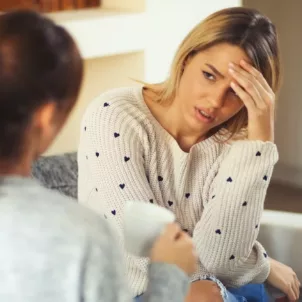With help from two psychologists, learn how to end a friendship gracefully and without hurting feelings. Plus: the 5 reasons why you should consider a friendship breakup.
Good, healthy friendships are among the greatest things that make life worth living. After all, the quality and depth of friendships aren’t only associated with life satisfaction, but can also impact your physical health and longevity. And after the pandemic, staying connected with friends has taken on a new meaning, given the universal increased levels of loneliness due to the pandemic.
But what happens when friendships are outgrown, one-sided, or even toxic? Further, how can you effectively notice the signs of a bad friendship, and understand when and how to end it?
To get to the heart of the matter, we asked two mental health experts how to end a friendship—and what the reasons to end a friendship are.
What Does a Healthy Friendship Look Like?
Before we get to the major reasons to end a friendship, understanding what a good, healthy friendship looks like may give you a better perspective.
So, what exactly makes a healthy friendship?
Trust
“A healthy friendship is borne out of trust and experience,” begins Sanam Hafeez, PsyD, a psychologist based in New York. “Both are built over a few months or even a couple of years unless you’re very young.”
As you share more experiences together, you build trust with your friends. But what exactly is trust? Marisa G. Franco, PhD, a psychologist and friendship expert based in Washington, D.C., says that trust means that a person is reliable and will hold what you say in confidence.
Open, Honest Communication
”With open, honest communication and mutual respect, friendships can thrive in a safe space,” says Dr. Hafeez. “Safe space can be freedom to be who you are, express your vulnerabilities, and not feel judged or condemned.”
Such grounds for open communication and vulnerability don’t appear overnight. Instead, it takes time, effort, and subtle shifts through successive interactions for both parties, in which you show up to support each other. When you don’t need to censor yourself—whether for personal, social, or political reasons—the freedom and safety attached to putting yourself out there “ends up carrying a lot of weight in a growing, healthy relationship,” she adds.

Respect and Reciprocity
“Earning your friends’ respect and being able to respect them is a large part of [the friendship] equation,” says Dr. Hafeez.
Additionally, Dr. Franco emphasizes respect in regards to reciprocity by way of:
- Mutual affection (read: actually liking each other)
- Lending support in times of need
- Investing in each other’s success
Support for Each Other’s Values
Dr. Franco mentions identity affirmation as an essential marker of friendship. By that, she means that “you affirm who your friend is, even when it counteracts your personal views.”
This sign of a mature, healthy friendship can pose a challenge—particularly when you don’t agree with their choices.
Whether it comes to something as innocuous as a friend’s choice to quit their job to travel the world for a year (whereas you’re more “practical”), or something more fundamental (like their advocacy for a political cause you don’t agree with), the idea is to be there for them regardless.
“If I’m good at identity affirmation, I’d recognize that my friend’s values don’t have to match mine,” she explains. However, “I can support them in living their version of their best life.”
Essentially, live and let live—as long as their choice isn’t dangerous or harmful.

5 Reasons to End a Friendship
If a friendship lacks one or more the signs outlined above, it may be time to end it. Further, if you notice any of the instances below at play, you’ll learn how to identify a bad friend and gain even more clarity.
Here are both signs of a bad friendship, as well as a scenario in which it’s simply run its course.
1. You’re Growing Apart
The first reason to end a friendship is that you’ve simply outgrown it.
As time passes and your priorities and values shift, it’s natural to grow apart from friends and have fewer things in common with each other. So if you feel as though you can’t relate to (or merely vibe) with one another, it could be time for a friendship breakup.
In this case, while the friendship breakup might be bittersweet, it could end up being best for you both. “People can grow apart in all relationships, but it doesn’t happen overnight,” says Dr. Hafeez. “Just like friendships take time to build, they also take time to disintegrate, save for a major event or betrayal.”
She explains that in many cases, people check out long before friendships officially end. If you don’t want to get to that point, she advises against disconnecting. “Keep a conversation going, even if—and especially if—it’s uncomfortable.”
2. They Won’t Hear You Out
If a friend won’t engage in a healthy, adult conversation—perhaps by talking over you, refusing to listen to you, or dismissing your perspective and feelings—that’s a tell-tale sign of a bad friendship.
Dr. Hafeez says that if your efforts to have a normal conversation (or rationally discuss issues in your relationship), “fall on deaf ears, feel free to evolve away from that person.”
3. You Feel Disrespected
While not being heard is one clear instance of disrespect in a friendship, it’s only one of many examples of a toxic friendship.
In terms of respect (or rather, a lack of it), the main reasons to end a friendship include when someone:
- Doesn’t value your time or energy
- Doesn’t honor your boundaries
- Lacks empathy or deems you as being “too sensitive”
- Continues to do/say things they know upsets you
- Takes from you while not giving anything back
- Ghosts you consistently

4. They Make You Feel “Less Than”
Similar to the point above, a clear sign of a bad friendship is when someone willfully brings you down instead of building you up.
“When it’s clear that a friend isn’t rooting for your success, it might be time to end it,” says Dr. Franco. “This might look like them tearing you down when you share an accomplishment.”
Other examples of manipulation and feeling “less than” include:
- Calling out your insecurities
- Cracking insidious jokes at your expense
- Creating an environment in which you have to walk on eggshells
- Gaslighting (i.e., reframing the narrative to make you question reality and your sanity)
These instances all indicate a toxic friendship where there’s an unhealthy power dynamic at play. If left unchecked, it can gradually chip away at you, potentially resulting in a lack of self-esteem, confidence, and faith in yourself.
“When you consistently leave their company and feel drained, or you feel like a shrunken version of yourself around them,” Dr. Franco says these are entirely valid reasons to end a friendship.
Further, if your bad experiences with/concerning them outweigh the positive ones, it’s officially time for a friendship breakup.
5. They’ve Betrayed Your Trust
While many of the reasons to end a friendship build up over time, a betrayal of trust is an element of a toxic friendship that entitles you to sever ties immediately.
Dr. Franco outlines a few ways in which this can manifest, such as by:
- Revealing things they said they’d hold in confidence
- Putting your safety at risk
- Not being there for you in times of need
Additionally, if a person has demonstrated such instances with others—say, constantly sharing someone else’s secrets or admitting they ignore people who rely on them—there’s a good chance you’re not immune to having the same happen to you.
Should You End a Friendship?
Before you pull end a friendship, Dr. Franco urges you to first evaluate where the other person is coming from.
“It’s normal for a lot of these issues to come up across the lifespan of the friendship,” she shares. “Your friend’s behavior may be because they’re going through a tough time.” And while that may not be an unimpeachable excuse to let them off scot-free, it’s still a consideration to keep in mind.
“It’s always a good idea to have an open conversation and give your friend a chance to change before ending it,” she adds. However, when problematic patterns are longstanding, you have the “evidence” you need to move forward.

How to End a Friendship with Grace
Wondering how to end a friendship without hurting feelings? Experts agree: Have a transparent discussion.
That said, they both believe that the method of doing so will depend on the depth and nature of the specific relationship at hand.
1. Get In the Right Mindset
“Processing your emotions in real-time and allowing them to unfold is a major step in making the decision to end a friendship,” explains Dr. Hafeez. “It should take time and thoughtfulness, and shouldn’t be done in haste.”
Read: Don’t let your emotions or sense of injustice overpower you in the moment, and resist the urge to fuel more drama. Instead, take a moment to sit with your feeling and process what your desired outcome is after the fact.
“If you do it with the right mindset, you lessen [any] post-friendship breakup guilt and negative emotionality,” she continues. Dr. Hafeez also suggests writing yourself a letter about why you’re doing this. “Read it after the fact, if only to remind you that you felt that way, and that it wasn’t a flippant decision.”
2. Strategically Retreat
“For newer, more budding friendships, it’s okay to take a more subtle approach,” Dr. Franco advises. Ending a friendship may not include a full confrontation, but perhaps a gradual retreat.
You may want to plant a seed—for instance, gently yet succinctly voicing what’s bothering you—and see how things unfold from there.
Also, for newer friendships or ones in less egregious instances, Dr. Hafeez notes that it may be beneficial to “quietly drift away to reduce unnecessary pain and hurt.” If you sense that you may feel differently in a few months’ time and want to reconnect, this might be your best option.
3. Choose the Best Means of Communication
If you’re certain that you need to end an established friendship, the best way to do so is with a direct conversation. “If you don’t, you might trigger ambiguous loss, which is grief that’s hard to process because we lack closure,” Dr. Franco warns.
If you feel that you need closure to cope, Dr. Hafeez suggests meeting in person by inviting a friend to a neutral space to speak to them.
But if—based on past/recent experiences with them—you suspect the scenario would provoke additional conflict, she suggests ending the friendship over text (thoughtfully, of course).. But, it’s worth noting Dr. Hafeez says that texts “can open up a can of worms.” Prepare yourself for a variety of responses (including the worst-case scenario and be ready to block them if necessary.
4. Use First-Person Language
No matter the means in which you express your POV, Dr. Franco stresses the importance of speaking from your direct experience only.
“In this conversation, stick to ‘I’ statements rather than ‘you’ statements,” she urges. For instance, this could look like:
- “I feel that we’re no longer compatible” (vs. “You’ve changed”)
- “I don’t feel heard” (vs. “You never listen to me”)
- “I feel like our senses of trust are misaligned” (vs. “You betrayed me”)
5. Don’t Forget the Good Times
Lastly, if you want to soften the blow—or simply recognize that your friendship was healthy and valued in the past—feel free to do so.
“During the conversation, you can acknowledge that the friendship was mutually beneficial at some point in time,” says Dr. Franco. “Share those positive memories so that you don’t both see the friendship as a ‘waste.'”

What to Do After Ending a Friendship
When you end a toxic friendship (or one that’s no longer functional), know that guilt, fear, separation anxiety, and the like are par for the course.
However, consider these difficult emotions necessary growing pains for you to move on, recognize your self-worth, and focus on the relationships and other priorities that bring you joy. (However, if you feel that greater issues are at play, consult a therapist or mental health professional.)
Dr. Franco assures us that it’s normal to feel crushed at a friendship ending, no matter the reason why it did. Because of this, it’ll still likely take time to come to terms with the fallout.
“We don’t have a ‘script’ for such grief as we do for romantic breakups, which makes it feel even harder because we can feel more isolated in our pain,” she shares. “Still, give yourself time to feel your feelings. Don’t try to push yourself to ‘get over it.’ Grief isn’t a race.”
The Takeaway
Given the importance of friendships in our lives, ending one is a big decision. Consider all of the reasons to end a friendship thoroughly before making your decision. And if you’re stuck on how to end a friendship, remember that a direct, honest conversation is usually the best way to go.
On a parting note, Dr. Franco wants us to remember that outgrowing your friends is a natural part of life. “It also makes room for new connections that better fit who we are,” she notes, which will serve to your benefit in the long run. In the meantime, lean on your other friends who lift you up and demonstrate how they value you. Dr. Franco also encourages sharing your grief about the other friendship ending. “In doing so, the ending of one friendship can lead to the deepening of another.”











